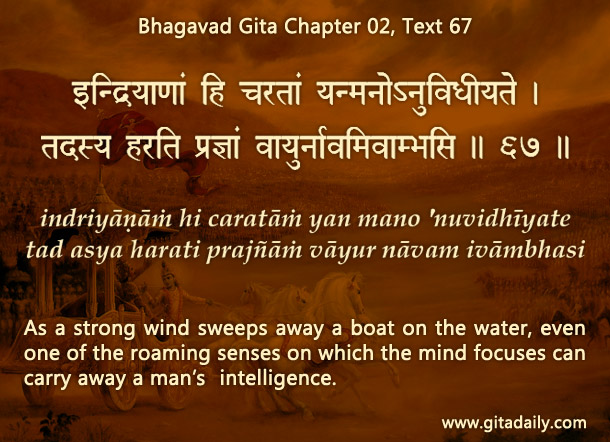Suppose, while driving, we hear a radio warning that a storm is going to sweep across the road ahead. We would prudently delay or divert our journey. If we foolhardily kept going that way, the storm would sweep us away.
The Bhagavad-gita uses the metaphor of a stormy wind to caution us against exposing ourselves unnecessarily to temptation. It (02.67) states that when we let the mind contemplate on the sense objects perceived by the roaming senses, that contemplation triggers a stormy desire which first sweeps our intelligence away and then sweeps us away. That is, it first makes us forget right and wrong, and then makes us do crazy things, even terrible things. Once we are caught in the throes of our mind, resisting its forceful promptings is almost impossible – it’s like resisting a storm after we are caught in it.
Just as an atmospheric storm can be physically disastrous, the desire storm can be spiritually disastrous. We have to endure the karmic consequences of our wanton indulgence, including especially the consequence of the aggravation of those desires, which increases both the frequency of future storms and our vulnerability to them.
How can we avoid such danger? By remembering that contemplating sense objects puts us in a storm’s way and by conscientiously avoiding such contemplation. Of course, we need to contemplate something. So, the best way to avoid contemplating tempting objects is to have something better to contemplate. Bhakti-yoga offers us stimulating and fulfilling objects for spiritual contemplation: Krishna in his many manifestations.
During our life-journey, if we keep ourselves engaged in Krishna’s remembrance and service, we can stay not only safe but also spiritually satisfied. More importantly, we can progress steadily towards his eternal abode, which is forever out of the way of all sensual storms.
To know more about this verse, please click on the image
Explanation of article:
Podcast:


KRISHNA helps us to stand against all emotional storms
Your words keep me alive. Hare Krishna